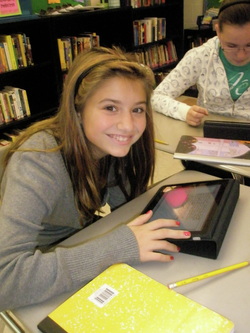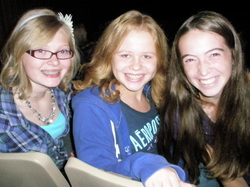Getting in the Flow-- Essential Questions and Planning Units

Units of study in English classes seem to work well when organized by THEMATIC QUESTION or ESSENTIAL QUESTION. That is, questions that are CONTENTIOUS, REAL-WORLD (and important to kids in our classes),and SUSTAINABLE (for several weeks, a trimester or a semester).
It also needs to honor a few basics: FLOW ( social, appropriately challenging, engaging to the point the students lose track of time, with clear goals, including immediate feedback for the learning goals, and where students have some control or choice over their learning); and focusing on READING, WRITING or DISCUSSING each hour.
See the resources below to help you plan a unit of study around an essential question.
It also needs to honor a few basics: FLOW ( social, appropriately challenging, engaging to the point the students lose track of time, with clear goals, including immediate feedback for the learning goals, and where students have some control or choice over their learning); and focusing on READING, WRITING or DISCUSSING each hour.
See the resources below to help you plan a unit of study around an essential question.
| unit_planning_example.pdf |
| unit_planning_template.pdf |
Some Examples...

Essential Question: Can we see things as they really are? Should we?
Sub questions: How does the media shape our views? What is reality? How do we judge what we believe to be true? When do we have an obligation to tell the truth? What clouds our vision? Is it true that perception is reality? How do we know who and what to trust?
Big writing: Unsolved mystery research paper (see RESEARCH)
Working on: MLA format; documenting quotations; gathering information; discerning reliable information and sources; paraphrasing and taking notes; believable narration; dialogue; participial phrases; FANBOYS comma rule; continuing work on detail, description, voice and word choice
Text choices: Tangerine (Bloor); National Treasure movie; "Anger for Hire" (Reader's Digest article); political ads; "The Cost of Cool" (PBS Special); "Button, Button" (Matheson); "To Serve Man" (Twilight Zone); advertising; optical illusions; "The War Prayer" (Twain); "The Monsters Are Due on Maple Street" (Serling); "War of the Worlds" (Welles)
Activities and Lessons:
Essential Question: How can people use their unique gifts and talents to help the world?
Sub Questions: What makes people unique? What are the benefits to standing out from the crowd? What are the benefits of blending into the crowd?
Big Writing: Personal narrative essay (see NARRATIVE)
Working on: Writing with details and description; identifying a theme; participial phrases; reading poetry; reading strategies (questioning, visualizing, predicting, summarizing); writing with emotion; writing with thoughts, actions and details (Add a T.A.D.); metaphors; verb choice; non-fiction reading; fiction elements (conflict, resolution, protagonist, antagonist)
Text choices: Stargirl (Spinelli); "The Sneetches" (Seuss); "Almost Ready" (Arnold Adoff); "Remember Me" (Vivian VandeVelde); "We Wear the Mask" (Dunbar); "Are You Who You Wanna Be?" (Switchfoot); 100 years from now greeting card text; "The Green Killer" (M.E. Kerr); "Diverse City" (tobyMac); "We" (Joy Williams); non-fiction articles about multiple intelligences; "And then they came" (Niemoller); NY Times article on Heath Ledger's death; "Harrison Bergeron" (Vonnegut); "The Moment I Knew I'd Never Be Cool" (from Chicken Soup book); A Bad Case of Stripes; Dog Breath; The Daft Bat; Crysanthemum; The True Story of the Three Little Pigs; The Rainbow Fish; The Yellow Star; I'm Gonna Like Me; Is There Really a Human Race?; The Happiest Hippo in the World
Activities and lessons: Where's Waldo; mapping activity; Presto-Changeo-Gameo
Essential Question: What is the role of the individual in society?
Sub questions: How can we determine the difference between right and wrong? What makes a true friendship? Who determines morality?
Big Writing: Definition paper (define morality or friendship in an essay using examples from the text and from real life)
Working On: supporting details; documenting quotations; supporting a thesis; working with dialect; Regionalism; reading critically; censorship; satire;
Text choices: The Adventures of Huckleberry Finn (Twain); "We Died on Our Mother's Laps" (Youtube-- part 1 and 2); "The Chaser" (Collier); Shrek or Simpsons (for dialect activities); article about banned books (RHNInc); "Spiderman in School" (James Hall); articles about Huck Finnn being banned; "A Modest Proposal" (Swift); "This I Believe" series (NPR); "5 Friends" (edited version from Youtube); "Are You Who You Wanna Be" (Switchfoot)
Activities and lessons:
Sub questions: How does the media shape our views? What is reality? How do we judge what we believe to be true? When do we have an obligation to tell the truth? What clouds our vision? Is it true that perception is reality? How do we know who and what to trust?
Big writing: Unsolved mystery research paper (see RESEARCH)
Working on: MLA format; documenting quotations; gathering information; discerning reliable information and sources; paraphrasing and taking notes; believable narration; dialogue; participial phrases; FANBOYS comma rule; continuing work on detail, description, voice and word choice
Text choices: Tangerine (Bloor); National Treasure movie; "Anger for Hire" (Reader's Digest article); political ads; "The Cost of Cool" (PBS Special); "Button, Button" (Matheson); "To Serve Man" (Twilight Zone); advertising; optical illusions; "The War Prayer" (Twain); "The Monsters Are Due on Maple Street" (Serling); "War of the Worlds" (Welles)
Activities and Lessons:
Essential Question: How can people use their unique gifts and talents to help the world?
Sub Questions: What makes people unique? What are the benefits to standing out from the crowd? What are the benefits of blending into the crowd?
Big Writing: Personal narrative essay (see NARRATIVE)
Working on: Writing with details and description; identifying a theme; participial phrases; reading poetry; reading strategies (questioning, visualizing, predicting, summarizing); writing with emotion; writing with thoughts, actions and details (Add a T.A.D.); metaphors; verb choice; non-fiction reading; fiction elements (conflict, resolution, protagonist, antagonist)
Text choices: Stargirl (Spinelli); "The Sneetches" (Seuss); "Almost Ready" (Arnold Adoff); "Remember Me" (Vivian VandeVelde); "We Wear the Mask" (Dunbar); "Are You Who You Wanna Be?" (Switchfoot); 100 years from now greeting card text; "The Green Killer" (M.E. Kerr); "Diverse City" (tobyMac); "We" (Joy Williams); non-fiction articles about multiple intelligences; "And then they came" (Niemoller); NY Times article on Heath Ledger's death; "Harrison Bergeron" (Vonnegut); "The Moment I Knew I'd Never Be Cool" (from Chicken Soup book); A Bad Case of Stripes; Dog Breath; The Daft Bat; Crysanthemum; The True Story of the Three Little Pigs; The Rainbow Fish; The Yellow Star; I'm Gonna Like Me; Is There Really a Human Race?; The Happiest Hippo in the World
Activities and lessons: Where's Waldo; mapping activity; Presto-Changeo-Gameo
Essential Question: What is the role of the individual in society?
Sub questions: How can we determine the difference between right and wrong? What makes a true friendship? Who determines morality?
Big Writing: Definition paper (define morality or friendship in an essay using examples from the text and from real life)
Working On: supporting details; documenting quotations; supporting a thesis; working with dialect; Regionalism; reading critically; censorship; satire;
Text choices: The Adventures of Huckleberry Finn (Twain); "We Died on Our Mother's Laps" (Youtube-- part 1 and 2); "The Chaser" (Collier); Shrek or Simpsons (for dialect activities); article about banned books (RHNInc); "Spiderman in School" (James Hall); articles about Huck Finnn being banned; "A Modest Proposal" (Swift); "This I Believe" series (NPR); "5 Friends" (edited version from Youtube); "Are You Who You Wanna Be" (Switchfoot)
Activities and lessons:
